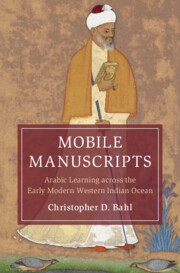Refine search
Actions for selected content:
2 results

Mobile Manuscripts
- Arabic Learning across the Early Modern Western Indian Ocean
-
- Published online:
- 30 January 2025
- Print publication:
- 06 February 2025
3 - An Ibadi Library in Cairo
-
- Book:
- The Ottoman Ibadis of Cairo
- Published online:
- 21 September 2023
- Print publication:
- 05 October 2023, pp 77-103
-
- Chapter
- Export citation
